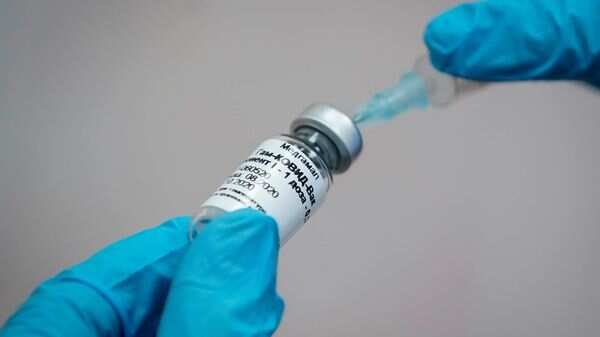JAMMU: The Chief Secretary, B V R Subrahmanyam today chaired a marathon meeting with Deputy Commissioners of all the districts along with their CMOs to kick off preparatory planning for the roll-out of COVID-19 vaccination for hassle-free and time-bound delivery of the vaccine across the Union Territory.Administrative Secretaries of departments of Health & Medical Education, Housing & Urban Development, Information, Divisional Commissioners of Jammu and Kashmir, Mission Director, National Health Mission (NHM) and Deputy Commissioners of all the districts along with concerned Chief Medical Officers (CMOs) were present at the meeting.The meeting was informed that the COVID-19 vaccines are currently in the third phase of clinical trials and will be available for usage soon. It was also conveyed that to effectively deliver the vaccines at the grass-root level, all districts must undertake detailed micro-planning with regard to vaccination sites, cold chain storage points, and logistics requirements.MD, NHM informed that currently, the database of prioritized groups of beneficiaries is being compiled with regard to healthcare workers both in government and private establishments, and frontline workers including armed forces, home guards, police, volunteers, municipal workers; who will be administered the vaccine in its initial stages. The next group that could be taken up for vaccination would comprise persons above the age of 50 years, and persons with co-morbidities followed by the remaining population. For this, a detailed survey would be needed for which the data from Swastha Nidhi survey is being retrieved which will then be augmented with the required additional data.Further, it was informed that to carry out a dedicated COVID-19 vaccination drive, around 4,500 vaccinators are being identified across the UT with a capacity of administering 100 vaccines per site per day- cumulating to an impressive capacity to deliver 4.5 lakh vaccines a day.Regarding the human resource requirement at each vaccination site, the Chief Secretary asked the Health department and district administrations to depute 2 trained vaccinators, 1 data operator, 1 record keeper, and 3 volunteers per site to ensure a well-coordinated and accessible vaccination drive.Further, Chief Secretary directed DCs to ensure submission of micro plans for vaccination sites, cold chain storage points, and logistics requirements by 7th December, 2020. He said that the information regarding the number of vaccination sites, beneficiaries per site/vaccines required, the requirement of ancillary equipment such as vaccination boxes, syringes, ice packs, hub cutters, bio-waste disposable bags; must be worked out well in advance and be readily available with the health department.Chief Secretary impressed upon the concerned that special efforts should be undertaken to ensure maintenance of the cold chain throughout the distribution channels. DCs were asked to calculate the requirement of Ice Lined Refrigerators (ILRs), deep freezers, large and small cold carrier boxes, and ice packs based on the number of storage points and vaccination sites identified for the purpose. “The efficiency of the vaccination drive will depend upon the accuracy of the micro-planning at district and block levels”, the Chief Secretary said.The H&ME Department was asked to ensure that the existing arrangements for COVID-19 testing and routine immunization drives for children and pregnant women are not adversely affected by the COVID-19 related vaccination drive. The Department was advised to engage additional vaccinators among MBBS/BDS doctors/interns, staff nurses, auxiliary nursing midwives, pharmacists, and retired persons, besides training potential vaccinators.Chief Secretary called for greater coordination between the frontline workers of various departments including health, social welfare, school education, rural development, and housing and urban development for conducting a successful vaccination drive.Chief Secretary also emphasized the need for evolving a multi-sectoral response to the roll-out of the COVID-19 vaccine by involving NGOs, NCC, and other volunteers, besides maintaining open and transparent communication through a proactive IEC strategy to curb misinformation and rumors.
ABOUT US
Sach News® - raising the voice of people of Jammu Kashmir since 1940. We are Publishing House of Daily Sach (Urdu Daily). Sach News, is one of the Oldest News Group of India having its office in Jammu Kashmir, Delhi. Reach us for Latest news on politics, sports, crime, education, real estate, business entertainment and much more. We provide you with the latest breaking news and videos straight from the ground zero.
Contact us: [email protected]
© Sach News Network 2011-2024 | Maintained by Sach Info Tech


